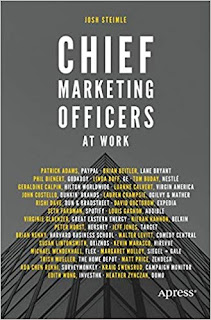CMOs at Work by Josh Steimle is not really a book. It is a compilation of 29 interviews conducted by him with 29 of the best marketing brains in the world. Some of the CMOs interviewed are really inspiring like Patrick Adams, PayPal and Jeff Jones, Target. Most of the interviews have some insights which are incisive and useful.
The author here has done a good job of meeting so many CMOs from diverse industries. But I wish he had covered CMOs from across the world. That would have been a great comparative study for a person like me who is a student as well as a practitioner of marketing for years. Also Josh Steimle used, more or less, the same set of questions for different CMOs. I felt that was limiting. There should have been questions specific to the industry, each CMO is operating in and a focus on relevant cases / stories. That would have added a lot of depth to the responses of the interviewees.
Nevertheless, here are some of my takeaways from this book, which will hold the test of the time.
1. The role of CMO has moved beyond the classic brand building and advertising. It has evolved into a much more holistic role that straddles technology, customer service and CRM. Digitization and Automation have played an important role in this.
I personally have felt these changes happening in the way my role and goals have shaped over the years. Reading this book assured me that I am on the right path and the marketer's role will evolve even further in ways not imagined in the past. I have also seen an integration happening across some verticals like PR, Internal Communication and Employer Brand with the Consumer Brand. No longer we can afford to see them in silos. In my current organization, the CEO is supportive of this approach and it helps in breaking down the silos faster.
2. Data Science is assuming a higher importance & ROI for marketing is becoming much more sharply defined.
I have witnessed this in digital marketing in India over last decade. But I still see a lot of digital quacks and charlatans peddling their substandard stuff around, because CMOs have not kept pace with changes here. These agencies and practitioners are very comfortable with likes, shares and other such engagement metrics, but they find it difficult to establish business metrics. As a marketer it is very important to be able to separate wheat from chaff. Also, the ROI for marketing will move beyond digital marketing, to traditional marketing as well, and we need to be ready for that.
3. Team Building and Leadership Skills are two areas which CMOs need to look at more creatively. As marketing becomes more dynamic, content oriented and ROI driven, it is important to add diversity in your team rather than just running after MBAs. Also the team structures can't be as simple as Traditional Marketing and Digital Marketing. There is no differentiation at all between these things.
I feel marketing teams have to be structured around skill sets rather than functions. Example a creative person has to support both branding and digital marketing initiatives.
4. A new age marketer has to be a combination of a data analyst, creative designer and process engineer who can execute fast.
My direct reports who have done any of the above two right have generally grown faster than others. But I feel comfort with data, is something more marketing managers in India should develop. And soon.
5. Few things in marketing will never change
- Brands should have a purpose
- Focus on consumer understanding has to be always there
- Data should supplement a marketer's judgement not replace it
- Story-telling is always going to be a key skill
In the world of so much information and data, marketers should not feel that 'creative' has become a bad word. I see that happening very often around me. Marketing has always been a whole brain function. We need to embrace the fact that more information is now available so our methods have to undergo a change.
6. The book also warns CMOs against too much internal focus. One should never forget that marketing serves the customers and not different departments.
Many times, marketers face this dilemma. I think strict focus is required to know what to do. It is not easy, but that should be the goal. Customer should be at the center of everything you do. Sales will follow.
It would be difficult to summarize everything from the book. But the 6 points above really nestled in my mind. One of the interviews though had a perfect answer to what really marketing is - Marketing has 3 focus areas: Data and Analytics; Marketing Technology; and Content and Thought Leadership.
---
As far as my reading targets go, I am on track so far. 12 books read and reviewed within 6 months of the year. 12 more to go...

2 comments:
Hey, skipping through from the #AtoZChallenge Road Trip list to check out your latest post. An interesting book to review. Did you get a request to review it, or simply chose that title at random?
No Jen. In 2018 I have taken a target of reading two books a month on an average. And then write about them here. I am trying to read mixed genres. So this one is something directly related to my career.
Post a Comment